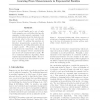Free Online Productivity Tools
i2Speak
i2Symbol
i2OCR
iTex2Img
iWeb2Print
iWeb2Shot
i2Type
iPdf2Split
iPdf2Merge
i2Bopomofo
i2Arabic
i2Style
i2Image
i2PDF
iLatex2Rtf
Sci2ools
ICML
2009
IEEE
2009
IEEE
Learning from measurements in exponential families
Given a model family and a set of unlabeled examples, one could either label specific examples or state general constraints--both provide information about the desired model. In general, what is the most cost-effective way to learn? To address this question, we introduce measurements, a general class of mechanisms for providing information about a target model. We present a Bayesian decision-theoretic framework, which allows us to both integrate diverse measurements and choose new measurements to make. We use a variational inference algorithm, which exploits exponential family duality. The merits of our approach are demonstrated on two sequence labeling tasks.
Bayesian Decision-theoretic Framework | Exponential Family Duality | ICML 2009 | Integrate Diverse Measurements | Machine Learning |
Related Content
| Added | 17 Nov 2009 |
| Updated | 17 Nov 2009 |
| Type | Conference |
| Year | 2009 |
| Where | ICML |
| Authors | Percy Liang, Michael I. Jordan, Dan Klein |
Comments (0)

